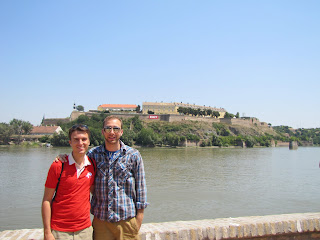On Saturday we spent the day in Novi Sad, in the north of Serbia. Novi Sad is in the province of Vojvodina. Serbia is divided into three provinces: Vojvodina in the north, Central Serbia, and Kosovo in the south (disputed). Vojvodina is a very interesting region, as it is known for its multi-ethnicity (Serbs, Croats, Hungarians, Slovaks, etc.). On the way to Novi Sad, we stopped at the former seat of the Serbian Orthodox Patriarchy, and at a church that remarkably has a Christian cross and the Muslim crescent together. According to our tour guide, it is the only church with such a symbol. Of course, historically this region saw a lot of conflict and interaction between empires of different faiths: such as the Ottomans and the Austro-Hungarians. Nevertheless, it was fascinating to see such a multi-religious symbol.
Novi Sad, the capital of Vojvodina, is a really charming city. An old church towers the skyline and pedestrian boulevards are prevalent in the city center.
The city is situated on the Danube river. Novi Sad has a "beach" on the river: one that I fully took advantage of due to the extreme heat that has hit Serbia in the last week. Internationally, Novi Sad is known for the Exit Festival which just ended. This festival brings in thousands of tourists to Serbia every year that flock to see the impressive line ups of pop, techno, and alternative artists.
On Monday, we visited the Republic of Serbia's Office of the War Crimes Prosecutor. The lecture we were given was fascinating! It really was the best academic experience I have had thus far in Serbia. The representative of the War Crimes Prosecutor's office gave us a frank, open, and informative discussion on the difficult work of his office. Mainly he focused on the history of war criminals in Serbia and the political and judicial difficulties of investigating, arresting, and possibly extraditing prominent war criminals. It is important to note that the work of war crimes prosecution is considerably linked to democratic progress and future Serbian membership in the EU. Very recently, Ratko Mladic, the former General of the Yugoslav People's Army who is accused of genocide and ethnic cleansing that took place in Srebrenica and during the siege of Sarajevo, was arrested and extradited to The Hague to the International Criminal Tribunal for the Former Yugoslavia.
In the end, the speaker proved to be really objective and could see the larger scope of the Balkan problems. He, a Serb, could recognize that war criminals, although Serbian, have to be brought to justice. He commented on the public opinion in Serbia being very low in terms of the support for prosecuting war criminals. I learned that the situation in Serbia is extremely complex regarding its past. Ordinary people do not want to admit that people of their nationality committed horrendous crimes, and that their country was the main culprit for many of the tragedies that shocked the consciousness of the world during the 1990's. However, the work of this office must go on for the good of Serbia, the region, and the international community. I walked out extremely satisfied from the lecture, as I saw that serious, thoughtful, methodical, and passionate people were working hard on these extremely sensitive issues.
Today we had two key events. First, we visited the Serbian Parliament and met with two Members of Parliament from the Serbian Democratic Party, the part of the current Serbian President Boris Tadic. Firstly, the parliament building is absolutely beautiful inside. Great marble columns, impressive long wooden tables, and ornate designs are found throughout the corridors and rooms of this building. It was interesting to hear about the symbols of the statues found in the Parliament. Statues of historic Croat and Slovene leaders, and symbols from the Yugoslav era are found, such a plaque of the first Non-Aligned Movement conference, which was chaired by Tito. This is rather strange due to the conflicts that defined the region during the 1990s.
The meeting with the two MP's was really informative, as they talked about everything such election laws, Kosovo and EU membership. However, their rhetoric reminded me of such dialogues found in the political system in Spain. They would brand the opposition as people not able to lead, and that their party could enact the real reforms needed. A main problem in Serbia is unemployment and a stagnant economy, which at first they said could be resolved by foreign direct investment and modernizing the economy. These were rather simplistic solutions, so I finally pressured them to give me specifics of their economic program. I was more impressed with their answers, as they provided me with a more substantive answer than I had expected. In the end, these two intelligent and young MP's gave a somewhat hopeful face to Serbian national politics.
Later in the afternoon we met with an NGO called the Centre for Applied Non-Violent Action and Strategies (CANVAS). They were originally called OTPOR and were a critical non-violent movement that led to the ouster of Slobadan Milosevic in 2000. They have now morphed into an organization that gives advice on how to conduct non-violent movements to other organizations/movements. Mainly they conduct workshops on strategic non-violence, how to overcome the barrier of fear, using media, etc. Basically they can provide the tools for change movements that wish to achieve political or social change, but they claim that revolutions cannot be exported and no such thing such as a "copy-paste" method exists. It is rather fascinating that they use their positive experience in the toppling of Milosevic to share with others who have similar political situations in their own countries.
As you all can see, the last few days have been really busy. However, they have been extremely interesting and I hope that every day will be like the ones I have described. Anyway, till the next time!




No comments:
Post a Comment